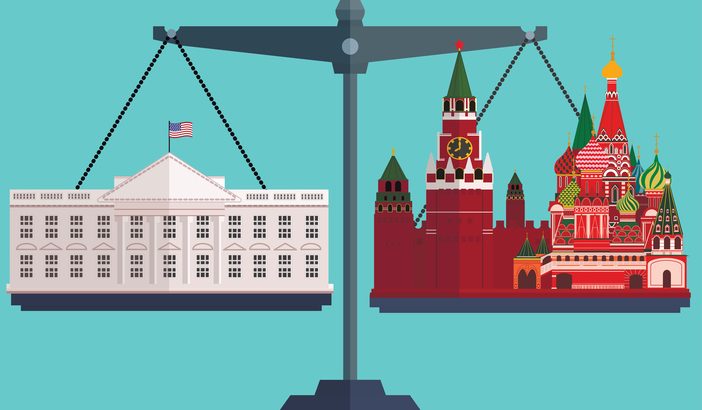A phalanx of largely libertarian critics has waged an online battle against historian Nancy MacLean over her book, while her sympathizers call the response a Koch-backed smear campaign. At the heart of the book’s purported plot to threaten democracy is a Nobel-winning economist whose ideas MacLean characterizes as “diabolical” and “wicked”: James McGill Buchanan.
Read More in The Chronicle of Higher Education
President Trump Wades Into Venezuelan Row
Donald Trump has threatened to take strong and swift action against Venezuela if President Nicolas Maduro imposes constitutional changes. That “signals a change in U.S. thinking,” says Fuqua professor Patrick Duddy, a former U.S. ambassador to Venezuela who now directs Duke’s Center for Latin American and Caribbean Studies. “Today’s announcement suggests Washington is considering much broader sanctions.”
Listen to More on the BBC
A Simple Fix to Encourage Bipartisanship in House
“A return to more bipartisanship and centrist politics requires changing the rules of the political game in ways that provide incentives for politicians to place the general welfare ahead of narrow partisan concerns,” writes professor Georg Vanberg, political science chair.
Read More in The Hill
‘Democracy in Chains’: Q&A With Nancy MacLean
History professor Nancy MacLean “has unearthed a stealth ideologue of the American right. Her book, ‘Democracy in Chains: The Deep History of the Radical Right’s Stealth Plan for America,’ tells the story of one James McGill Buchanan, a Southern political scientist and father of ‘public choice economics.'”
Read More at Moyers & Company
Finding The Truth in Complex Civilian-Casualty Investigations
“I contend that while witness interviews are certainly valuable, research in recent years shows that allegedly ‘eyewitness’ accounts carry their own risks and limitations,” writes law professor Charles Dunlap. “Accordingly, I believe that human rights organizations ought to rethink the extent to which they rely (over rely?) on such testimony to – as they put it – form the “bedrock” of their investigations, particularly in contested war zone areas.”
Read More in Lawfire
Amnesty Says Possible War Crimes In Mosul by U.S.-Led Coalition
Retired Air Force Maj. Gen. Charles Dunlap, now a law professor at Duke, questions Amnesty’s claim that coalition forces may have committed war crimes. “The law – which even in this context carries, as Amnesty International should know, a presumption of innocence – typically demands evidence of the attacker’s beliefs and intent before ascribing criminal liability. I didn’t see much of that in the report,” he says.
Read More at NPR

Gov. Brown is Supporting a Giveaway to Polluters
“California currently has one of the most comprehensive climate change and greenhouse gas (GHG) reduction programs in the world,” writes Mark Paul, a postdoctoral associate at the Samuel DuBois Cook Center on Social Equity. However, legislation supported by Gov. Jerry Brown “falls woefully short” if the goal is to safeguard both the Earth’s climate and the health of Californians, while promoting economic security of Californian families, he writes.
Read More in The Huffington Post

Potential Legal Troubles for Kushner, Trump Jr.
“… The statute is pretty clear that it`s a federal crime to solicit a campaign contribution from a foreign source,” says law professor Samuel Buell. “It`s pretty clear that anything of value can count as a campaign contribution and certainly opposition research is something that`s routinely paid for in the political world, and this could be something of value.”

The Impact of Trump Ignoring Political Norms
Duke Law School professor Neil Siegel says President Trump’s failure to follow long-standing political and constitutional norms “that have long disciplined the White House,” including hostility toward the news media and judicial system, has contributed to a “toxic” political climate.
Listen on NC Policy Watch
Legal Experts Say There’s Evidence of Collusion
“When alleged crimes arise from conversations, there are always fine lines to be drawn,” says law professor Lisa Kern Griffin. “But it is intent that governs which side of the legal line such a meeting falls on, not success. This is obviously not a cast of characters out of some John le Carré novel, and the meeting may have been a bumbling effort.”
Read More in Vox
What Is Collusion? Is It Even a Crime?
“Collusion, of course, is not a legal thing. The question of the underlying crime here might be tricky, and would include possible violation of campaign contribution laws. But if there is an underlying campaign violation in play legally, the email and meeting are very strong evidence of a nascent conspiracy and attempt to commit such an offense,” says law professor Samuel Buell.
Read More in Politico
Collusion? Conspiracy? Here’s What the Law Says
“Anytime you are talking about coordinating or collusion, you are talking about the possibility of conspiracy charges,” says law professor Samuel Buell, a former federal prosecutor. “But conspiracy is not a crime that floats by itself in the air. There has to be an underlying federal offense that is being conspired to be committed.”
Read More in The New York Times

